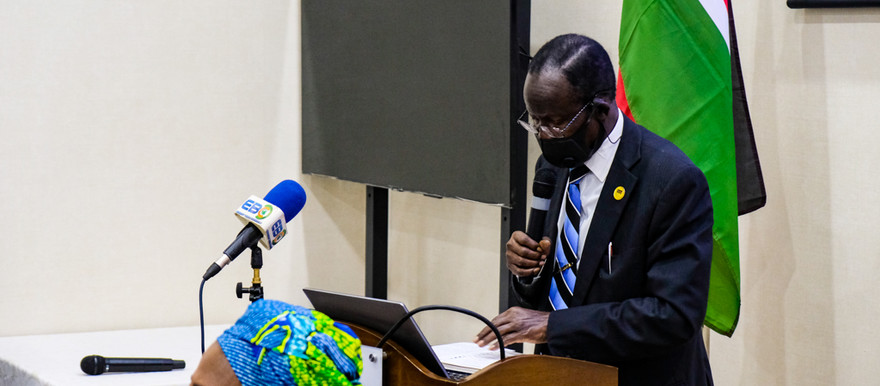The Vice President for Economic cluster Dr. James Wani Igga has called for the strengthening of anti-corruption institutions in the fight against what he calls, 'the financial pandemic, corruption' in South Sudan.
Speaking during the launch of the Human Development Annual Report 2020 in Juba on Wednesday, Wani Igga appealed for an end to corruption in public institutions as they discussed urgent linkages between corruption, environmental protection, and increasing human development in South Sudan.
He emphasized the need for national standardized accounting and monitoring systems to discourage unauthorized use of funds that negatively impact the government’s ability to efficiently implement policies that increase economic well-being and protect the planet.
“Number one, measures must be put in place for monitoring official conduct and exposing wrongdoing. This is the biggest loophole of corruption. Number two, a credible system for accessing charges for wrongdoings otherwise you will not know how to punish somebody, meaning you must have rules and laws," Wani said. "We must build a framework for insulating institutions watchdogs, like the audit chamber. Unfortunately, I think they need to be reinforced, their results are not felt in the society maybe there is an absence of reinforcement in terms of laws, and of course anti-corruption, our ombudsman."
He added that measures should be put in place to check fraud, money laundering, bribery, and misappropriation of public funds.
Dr. Wani was addressing the 30th anniversary of UNDP’s Human Development Report which reflects the unprecedented times of COVID-19 coupled with wide-spread and extreme weather events. The report argues that humanity and the planet have entered an entirely new geological era, the Anthropocene or the “Age of Humans”. Instead of the planet shaping human beings, mankind itself has begun to influence the environment – often to major consequences.
A statement seen by Radio Tamazuj quotes UNDP Resident Representative Christy Ahenkora as saying, “We are in an unprecedented moment in the history of our planet, with warning signs flashing red. But we have the choice to use human development to unlock the social, economic, and environmental transformations needed to rebalance our social and planetary systems so that humans and the planet thrive together. This action calls for a holistic and integrated approach, addressing the economic, environmental, and social dynamics of the threats we face in South Sudan.”
This year South Sudan has been plagued by floods, local conflict, widespread food insecurity, and the global pandemic Covid-19.
The Director of the Environment and Natural Resources Program at the Sudd Institute and a part-time lecturer at the University of Juba Nhial Tiitmamer said quote- "Sustainable development doesn’t mean that we must undermine our current needs [for human development] but means we must balance this with protecting the needs of future generations. In the next 50 years, South Sudan’s oil will be depleted. The forests and trees we cut down today, will be gone tomorrow. They don’t come back unless we act. Our substitutive rate needs to be equal to or more than our extractive rate.”
Six ministers and two deputies were present, including Rizik Zachariah Hassan, Minister of Wildlife Conservation and Tourism; Dr. Dhieu Mathok, Minister of Investment; Onyoti Adingo, Minister of Animal Resources and Fisheries; Joseph Lagu, Minister of Agriculture and Food Security; Kuol Athian, Minister of Trade and Industry; Puot Kang, Minister of Petroleum; Lily Albino Akol, Deputy Minister for Agriculture and Food Security; and Agok Makur, Deputy Minister of Finance and Planning.
According to UNDP, the Human Development Report calculates and ranks the Human Development Index (HDI) of 189 countries annually. The HDI measures a nation’s health, education, and standards of living. The 2020 edition of the report adds two more elements: a country’s carbon dioxide emissions and its material footprint. This year’s index shows how the global development landscape would change if both the wellbeing of people and also the planet was central to defining humanity’s progress.
South Sudan is ranked 185 out of 189 countries in 2020, corresponding to a life expectancy of 57.9 years, expected years of schooling (5.3 years), mean years of schooling (4.8 years), and gross national income (GNI) per capita of $2,003. South Sudan’s HDI value (0.433) ties with Burundi and surpasses Chad, Central African Republic, and Niger. Norway, Ireland, and Switzerland top the list with HDI values at or above 0.955.




